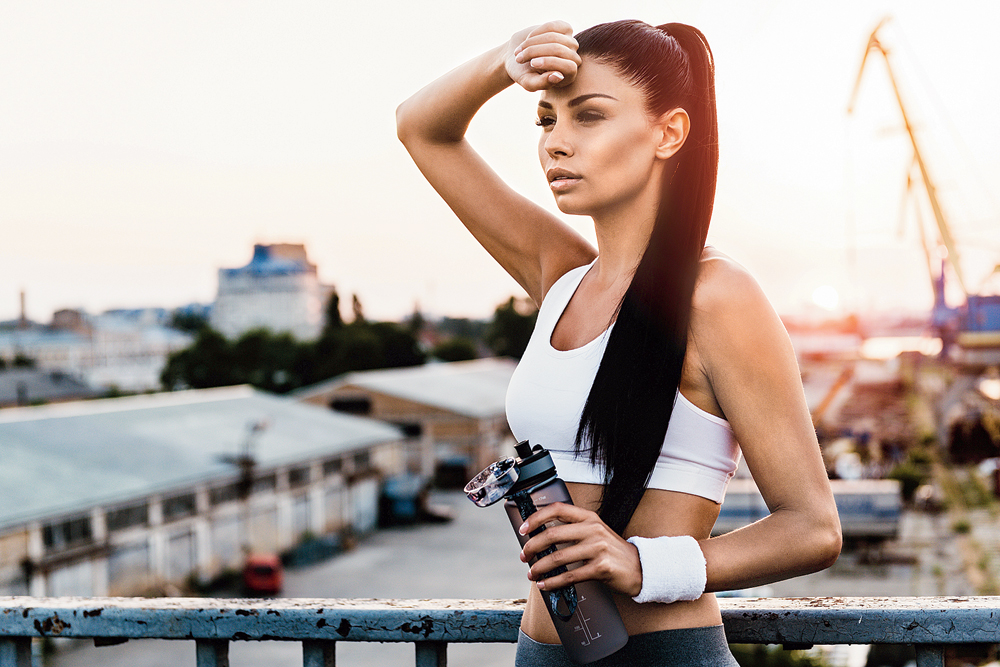The sun continues to blaze, bringing with it some serious sweat. Sweating on hot days cools the body by releasing heat. However, prolonged exposure to the sun can lead to excessive sweating, which not only means loss of water, but also important electrolytes. It can be dangerous and it can be prevented.
Water is undoubtedly the best coolant and a source of hydration. One should, however, avoid drinking excessive plain water after copious amounts of sweating as you may experience symptoms such as severe cramping, light-headedness or an elevated heartbeat. Addition of more fluids to your system without adding electrolytes may lead to severe electrolyte imbalance. So it is extremely important to recognise your body’s signals for loss of electrolytes, to avoid medical emergencies.
Common symptoms of electrolyte imbalance include…
+ Fatigue
+ Lethargy
+ Headache
+ Numbness and tingling
+ Fast heart rate
+ Nausea and vomiting
+ Diarrhoea or constipation
+ Abdominal cramping
+ Muscle cramping
+ Muscle weakness
+ Confusion
+ Irregular heartbeat
What are electrolytes?
It is the popular electrolyte powder or ORS powder available over the counter. Electrolytes are substances which when dissolved in a solution get slightly charged. They are present in body fluids. In fact, the whole body depends on the delicate balance of electrolytes to keep it functioning properly.
Sodium and potassium are particularly important in maintaining hydration levels, as the movement of sodium and potassium in and out of cells determines how much water our body retains or flushes out. They work synergistically to regulate our body fluids. They also help carry electrical impulses around the body. This is vital for a healthy nervous system, good mental health and proper sleep. Relaxation and contraction of all muscles depend upon electrolytes. Without the proper balance of electrolytes your muscles may become weak and you may experience cramps, twitches or spasms.
The most common electrolytes are sodium, chloride, calcium, magnesium, and potassium. Since we are talking about hydration, we will focus on sodium and potassium.
Sodium
Sodium has a vital role in nerve transmission and in the maintenance of water concentration in the blood and body fluids and hence is essential for life. Sodium (Na+) is important for regulating water and fluid balance in the body. It can be found in the bloodstream and indicates to the kidneys how much water needs to be retained and how much should be excreted. Sodium and chloride are primarily responsible for maintaining blood volume and pH. Too much sodium contributes to high blood pressure, and since sodium is found in salt, we are told to limit salt in our diets.
Interestingly, they are also the electrolytes that are lost most often when sweating. Hence, in situations where we sweat excessively, we need to supplement sodium, hence consume salt.
Potassium
Potassium (K+) is found inside cells and is important for regulating water and fluid in the body. It is also important for functioning of muscles and the heart, which contracts rhythmically to keep it pumping. It is also important for generating the electrical impulses that are important in nerve signalling. Although it’s not as easily lost while sweating as sodium chloride, prolonged exposure to sweating in hot environments can trigger loss of potassium.
Who is at risk?
Children, athletes, gym goers, runners and people who experience heavy sweating. For many, sufficient levels of electrolytes can be found in our diets. Fruits and vegetables are great sources of electrolytes, so if your diet is rich in these foods you should be fine. Over summer, many of us will require more electrolytes as the warmer weather causes us to sweat more. We most likely need to replace the electrolytes lost through sweating.
What is to be done?
Add salt. And I mean table salt, the one we add to our food while cooking; it’s essentially sodium chloride. The terms salt and sodium are often used interchangeably.
Sea salt is produced by the evaporation of seawater. It is rich in minerals — magnesium, calcium, potassium, and bromide to name a few. It is argued that since sea salt contains more minerals than table salt, the former is better for your health. Rock salt is commonly used as a salt substitute because of its high mineral content. WHO recommends adults should consume less than five grams (just under a teaspoon) of salt per day. But during summer months, you may need more if you sweat more. Just put a pinch in your water and drink. It’s that easy!
Tank up on potassium-rich fluids, such as coconut water, fruit juices, nimbu pani, lentil soups and leafy green vegetable juices along with coriander and mint. You can also consume potassium-rich fruits like bananas, mangoes, dates, prunes and vegetables such as sweet potatoes, drumsticks and raw papaya.
How about sports drinks, which are rich in electrolytes? Since they are high in sugar and chemicals, it’s not a good option for regular consumption. They may be useful in emergencies though, for example following an episode of heat exhaustion.
You can reduce your electrolyte and fluid loss by avoiding long exposure to the sun on hot days. Stay indoors during the hottest parts of the day — usually between 10am and 2pm — or, if you must go outside, look for shaded areas.
Go for your daily walk either early in the morning or late evening, when it’s relatively cooler. You can also reduce your physical activity to minimise sweating or you can even take your workout indoors.
If you suspect you’ve developed heat exhaustion or developed severe electrolyte loss, and you’re suffering from cramping or light-headedness, or a rapid heartbeat, seek immediate medical attention. A doctor can monitor your hydration level and electrolyte balance and administer appropriate intravenous fluids.
Hena Nafis is a consultant nutritionist and the owner of nutrition and lifestyle clinic Nutrience. In case you are feeling dehydrated, consult a qualified physician










